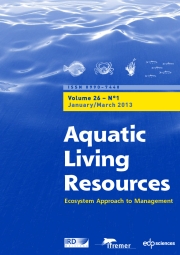Crossref Citations
This article has been cited by the following publications. This list is generated based on data provided by
Crossref.
Hu, G‐B
Cong, R‐S
Fan, T‐J
and
Mei, X‐G
2004.
Induction of apoptosis in a flounder gill cell line by lymphocystis disease virus infection.
Journal of Fish Diseases,
Vol. 27,
Issue. 11,
p.
657.
Alonso, M.C
Cano, I
Castro, D
Perez-Prieto, S.I
and
Borrego, J.J
2004.
Development of an in situ hybridisation procedure for the detection of sole aquabirnavirus in infected fish cell cultures.
Journal of Virological Methods,
Vol. 116,
Issue. 2,
p.
133.
Alonso, M C
Cano, I
Garcia‐Rosado, E
Castro, D
Lamas, J
Barja, J L
and
Borrego, J J
2005.
Isolation of lymphocystis disease virus from sole, Solea senegalensis Kaup, and blackspot sea bream, Pagellus bogaraveo (Brünnich).
Journal of Fish Diseases,
Vol. 28,
Issue. 4,
p.
221.
Cano, I.
Alonso, M.C.
Garcia-Rosado, E.
Saint-Jean, S. Rodriguez
Castro, D.
and
Borrego, Juan J.
2006.
Detection of lymphocystis disease virus (LCDV) in asymptomatic cultured gilt-head seabream (Sparus aurata, L.) using an immunoblot technique.
Veterinary Microbiology,
Vol. 113,
Issue. 1-2,
p.
137.
Cheng, Shunfeng
Zhan, Wenbin
Xing, Jing
and
Sheng, Xiuzhen
2006.
Development and characterization of monoclonal antibody to the lymphocystis disease virus of Japanese flounder Paralichthys olivaceus isolated from China.
Journal of Virological Methods,
Vol. 135,
Issue. 2,
p.
173.
Sheng, Xiuzhen
Zhan, Wenbin
Xu, Songjuan
and
Cheng, Shunfeng
2007.
Histopathological observation of lymphocystis disease and lymphocystis disease virus (LCDV) detection in cultured diseased Sebastes schlegeli.
Journal of Ocean University of China,
Vol. 6,
Issue. 4,
p.
378.
Cano, I.
Ferro, P.
Alonso, M.C.
Bergmann, S.M.
Römer-Oberdörfer, A.
Garcia-Rosado, E.
Castro, D.
and
Borrego, J.J.
2007.
Development of molecular techniques for detection of lymphocystis disease virus in different marine fish species.
Journal of Applied Microbiology,
Vol. 102,
Issue. 1,
p.
32.
Cano, I
Ferro, P
Alonso, M C
Sarasquete, C
Garcia‐Rosado, E
Borrego, J J
and
Castro, D
2009.
Application of in situ detection techniques to determine the systemic condition of lymphocystis disease virus infection in cultured gilt‐head seabream, Sparus aurata L..
Journal of Fish Diseases,
Vol. 32,
Issue. 2,
p.
143.
Cano, I.
Lopez-Jimena, B.
Garcia-Rosado, E.
Ortiz-Delgado, J.B.
Alonso, M.C.
Borrego, J.J.
Sarasquete, C.
and
Castro, D.
2009.
Detection and persistence of Lymphocystis disease virus (LCDV) in Artemia sp.
Aquaculture,
Vol. 291,
Issue. 3-4,
p.
230.
Zhan, Wenbin
Li, Yongqin
Sheng, Xiuzhen
Xing, Jing
and
Tang, Xiaoqian
2010.
Detection of lymphocystis disease virus in Japanese flounder Paralichthys olivaceus and other marine teleosts from northern China.
Chinese Journal of Oceanology and Limnology,
Vol. 28,
Issue. 6,
p.
1213.
Li, Qiong
Yue, Zhiqin
Liu, Hong
Liang, Chengzhu
Zheng, Xiaolong
Zhao, Yuran
Chen, Xiao
Xiao, Xizhi
and
Chen, Changfu
2010.
Development and evaluation of a loop-mediated isothermal amplification assay for rapid detection of lymphocystis disease virus.
Journal of Virological Methods,
Vol. 163,
Issue. 2,
p.
378.
Xu, Guojing
Sheng, Xiuzhen
Xing, Jing
and
Zhan, Wenbin
2011.
Effect of temperature on immune response of Japanese flounder (Paralichthys olivaceus) to inactivated lymphocystis disease virus (LCDV).
Fish & Shellfish Immunology,
Vol. 30,
Issue. 2,
p.
525.
Sheng, X.Z.
Song, J.L.
and
Zhan, W.B.
2012.
Development of a colloidal gold immunochromatographic test strip for detection of lymphocystis disease virus in fish.
Journal of Applied Microbiology,
Vol. 113,
Issue. 4,
p.
737.
Cano, I
Valverde, E J
Garcia‐Rosado, E
Alonso, M C
Lopez‐Jimena, B
Ortiz‐Delgado, J B
Borrego, J J
Sarasquete, C
and
Castro, D
2013.
Transmission of lymphocystis disease virus to cultured gilthead seabream, Sparus aurata L., larvae.
Journal of Fish Diseases,
Vol. 36,
Issue. 6,
p.
569.
Sheng, Xiuzhen
Xu, Xiaoli
and
Zhan, Wenbin
2013.
Development and application of antibody microarray for lymphocystis disease virus detection in fish.
Journal of Virological Methods,
Vol. 189,
Issue. 2,
p.
243.
Carballo, Carlos
Castro, Dolores
Borrego, Juan J.
and
Manchado, Manuel
2017.
Gene expression profiles associated with lymphocystis disease virus (LCDV) in experimentally infected Senegalese sole (Solea senegalensis).
Fish & Shellfish Immunology,
Vol. 66,
Issue. ,
p.
129.
Borrego, Juan J.
Valverde, Estefania J.
Labella, Alejandro M.
and
Castro, Dolores
2017.
Lymphocystis disease virus: its importance in aquaculture.
Reviews in Aquaculture,
Vol. 9,
Issue. 2,
p.
179.
Valverde, Estefania J.
Borrego, Juan J.
Sarasquete, M. Carmen
Ortiz-Delgado, Juan B.
and
Castro, Dolores
2017.
Target organs for lymphocystis disease virus replication in gilthead seabream (Sparus aurata).
Veterinary Research,
Vol. 48,
Issue. 1,
Vázquez, Diego
López-Vázquez, Carmen
Olveira, José G.
Bandín, Isabel
and
Dopazo, Carlos P.
2018.
Quantitative Flow Cytometry to Measure Viral Production Using Infectious Pancreatic Necrosis Virus as a Model: A Preliminary Study.
Applied Sciences,
Vol. 8,
Issue. 10,
p.
1734.
Sheng, Xiuzhen
Zeng, Jing
Zhong, Ying
Tang, Xiaoqian
Xing, Jing
Chi, Heng
and
Zhan, Wenbin
2022.
Peripheral Blood B-Lymphocytes Are Involved in Lymphocystis Disease Virus Infection in Flounder (Paralichthys olivaceus) via Cellular Receptor-Mediated Mechanism.
International Journal of Molecular Sciences,
Vol. 23,
Issue. 16,
p.
9225.


